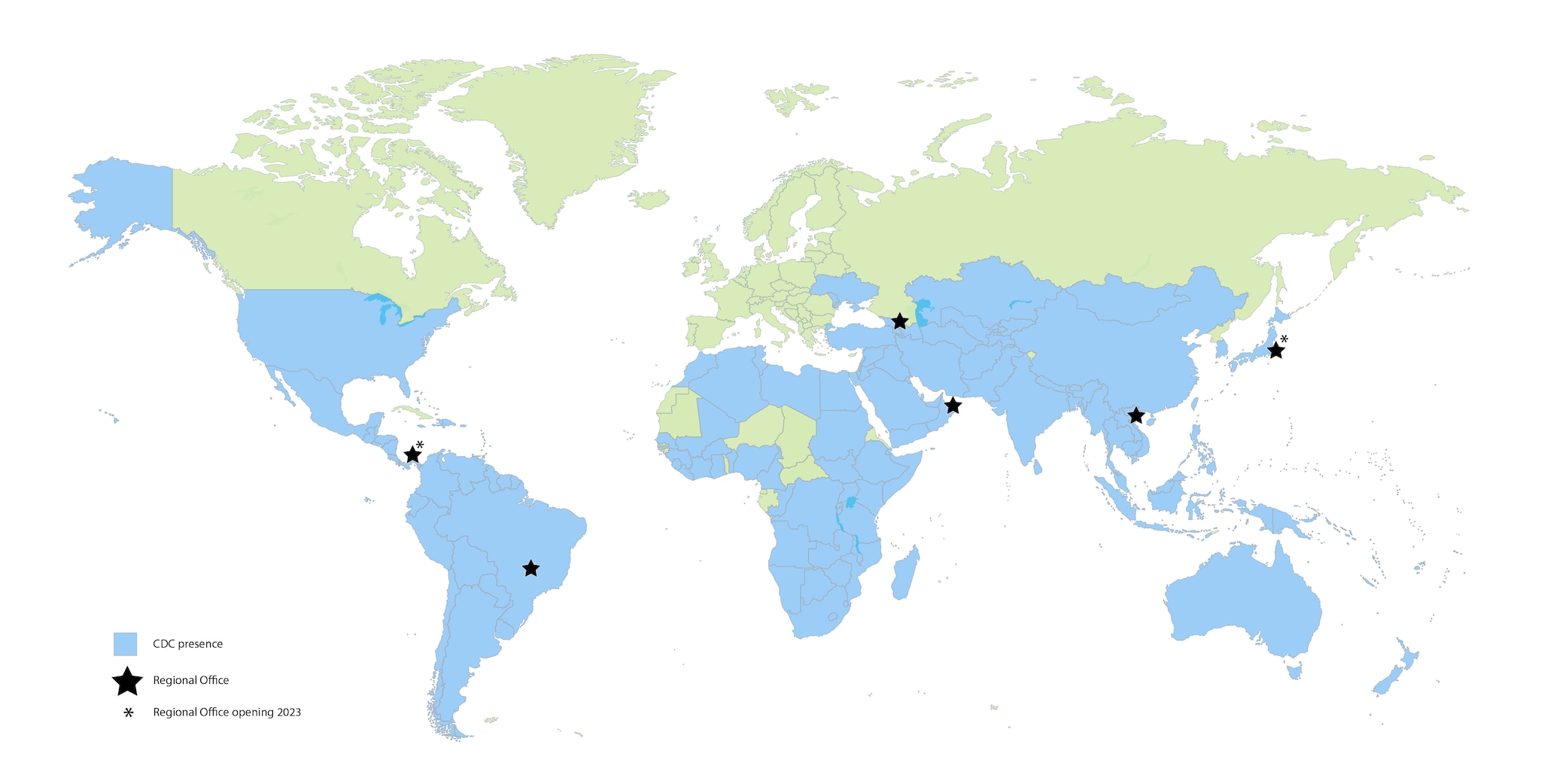CDC’s Global Presence
CDC’s global health work is enabled by country and Regional offices located in more than 60 countries worldwide. CDC Country Offices leverage expertise from across CDC to provide specialized scientific and program support to bilateral country partners, the World Health Organization, multilateral institutions, and implementing partners. CDC also has six Regional offices that collaborate with multiple countries and partners throughout a region to identify shared health priorities, coordinate activities across the region, and facilitate engagement with CDC programs, priorities, and scientific expertise both in countries and at CDC headquarters.
In addition, CDC Regional Offices:
- Provide a cohesive strategy for advancing health security
- Mobilize catalytic funding for regional and strategic priorities
- Support CDC Country Offices to advance programs bilaterally and through intra-regional collaboration
- Facilitate partnership with regional non-governmental organizations in support of the CDC regional strategy
- Serve as a backstop and technical support hub for CDC Country Offices during peacetime and emergencies
In addition to broad-based public health surveillance and data use, CDC also focuses on laboratory capacity, workforce development, and emergency preparedness/outbreak response as well as specific capabilities in infection prevention and control, antimicrobial resistance, vaccine readiness, disease prevention, border health, and special investigations.
The Enhanced Gonococcal Antimicrobial Surveillance Programme (EGASP) is a collaborative effort between CDC and the World Health Organization established in South Africa and Uganda. EGASP will allow for surveillance reporting in a global region with limited or no antimicrobial resistant gonorrhea surveillance or laboratory capacity. Prior to this program, there was no availability for urethritis testing in both countries. EGASP has since established the laboratory capacity and identified gonococcal strains concerning for resistance.
With funding from CDC through the U.S. President’s Emergency Plan for AIDS Relief (PEPFAR), the University of Maryland, Baltimore, conducted the fifth Botswana AIDS Impact Survey (BAIS V). In 2022, BAIS V found that Botswana was the first country to surpass the ambitious UNAIDS 95-95-95 targets for HIV epidemic control an impressive four years before the target date. According to BIAS V, 95% of persons nationally living with HIV age 15-64 reported knowing their status, 98% of people who knew their status were receiving antiretroviral treatment, and 98% of adults on treatment achieved viral load suppression.
CDC partnered with PEPFAR, Together with Girls, and interagency partners to support Mozambique in launching its Violence Against Children and Youth Survey (VACS) report. The Mozambique VACS report will guide recommendations and data-driven strategies to end all forms of violence against children and youth in Mozambique.
The number of Malaria cases diagnosed in the United States and its territories have increased since the mid-1970s, mostly driven by the rise in international travel. Malaria infections are preventable but can be fatal if not diagnosed and treated promptly with appropriate antimalarial medications. The number of malaria cases in the United States remains unacceptably high, and CDC continues to address the growing problem of domestic malaria cases by:
- Working alongside partners to reduce the global burden of malaria.
- Educating Americans about the risk of malaria and offering guidance for prevention measures that should be taken when visiting malaria-endemic regions.
- Assisting healthcare providers to diagnose and treat malaria in the United States.
CDC partnered with the Bill & Melinda Gates Foundation in Mozambique and Burkina Faso to measure the impact of a schedule change for the pneumococcal conjugate vaccine (PCV). CDC’s research, technical assistance, and policy leadership will inform future vaccine policy that may help these countries achieve higher and more equitable PCV coverage. High PCV coverage can improve quality of life and save the lives of thousands of vulnerable children.
CDC worked with international partners in Southeast Asia and Africa to assess folate status and inform neural tube defects prevention efforts. By analyzing red blood cell folate concentrations, CDC helped identify disproportionately affected populations and monitor neural tube defects burden in these areas. The results of this assessment helped inform policies regarding the fortification of food with folic acid that can prevent anemia and neural tube defects.
CDC’s Emergency Response Capacity Team and CDC’s Country Office in Tblisi, Georgia supported the Georgia National Center for Disease Control and Public Health’s establishment of a Public Health Rapid Response Team Program. The multidisciplinary team was trained and equipped to rapidly deploy specialists to respond to a public health emergency, serve as resources for non-emergency public health activities, safeguard against future public health emergencies, and provide a model for strengthening emergency management structures in the region.
Within two weeks of Russia’s invasion of Ukraine, CDC’s Eastern Europe/Central Asia Regional Office provided staff with the technical expertise, linguistic capabilities, and cultural competencies to support the response and recovery. CDC also led local emergency response trainings focusing on assessment, quality assurance, infection prevention and control and surveillance for healthcare-associated infections and antimicrobial resistance to address the surging burden of traumatic wounds.
